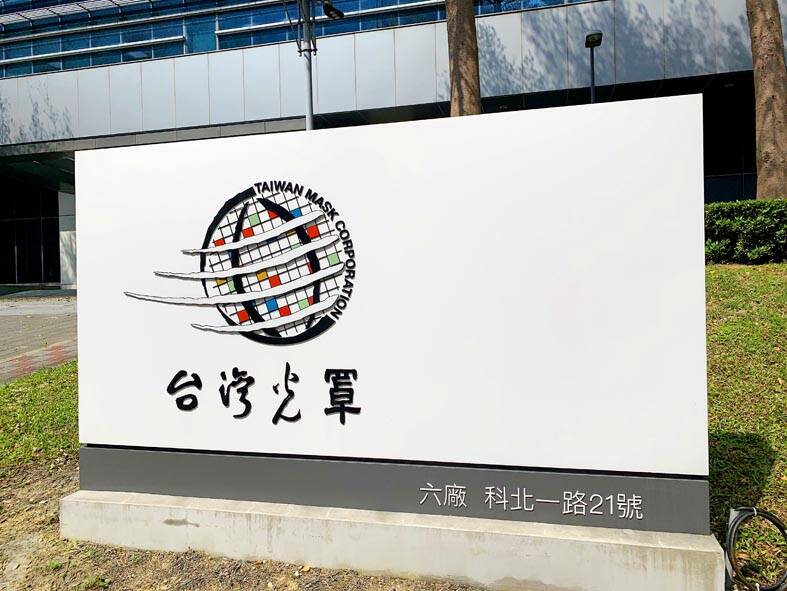Taiwan Mask Corp (台灣光罩), which specializes in producing photomasks used in semiconductor manufacturing, yesterday said it expects revenue to surge by almost 30 pecent to NT$10 billion (US$326.9 million) this year, buoyed by rising orders from major clients and higher average selling prices.
Revenue last year increased 27 percent to NT$7.74 billion.
Taiwan Mask said sales should gradually grow in the following quarters, after a projected decline of up to 24 percent to between NT$1.5 billion and NT$1.6 billion this quarter from NT$1.97 billion last quarter.

Photo: Grace Hung, Taipei Times
“The decline was mostly due to weakness in the consumer electronics segment,” Taiwan Mask president Lidon Chen (陳立惇) said. “We believe demand will pick up in the second half of the year.”
The first quarter should be the trough for this year, he said.
Revenue in the first two months of this year shrank 7.81 percent to NT$1.01 billion, as customer demand declined due to inventory correction.
Factory utilization is almost full and the company has seen a nascent recovery in demand from manufacturers of driver ICs used in touch panels, he said.
With ongoing plans for capacity expansion and technology migration this year, the company expects average selling prices to trend higher, Chen said.
As the company is scheduled to commence mass production of 40-nanometer masks later this year, revenue contribution from 12-inch masks would be higher than last year, another factor that would boost its average selling prices, it said.
Taiwan Mask has a 2 percent share of the global mask market and counts the world’s major foundry service providers among its customers.
The company plans to boost capital spending from NT$2.5 billion last year by between 20 and 40 percent to between NT$3 billion and NT$3.5 billion this year to focus on advanced technology.

DOLLAR CHALLENGE: BRICS countries’ growing share of global GDP threatens the US dollar’s dominance, which some member states seek to displace for world trade US president-elect Donald Trump on Saturday threatened 100 percent tariffs against a bloc of nine nations if they act to undermine the US dollar. His threat was directed at countries in the so-called BRICS alliance, which consists of Brazil, Russia, India, China, South Africa, Egypt, Ethiopia, Iran and the United Arab Emirates. Turkey, Azerbaijan and Malaysia have applied to become members and several other countries have expressed interest in joining. While the US dollar is by far the most-used currency in global business and has survived past challenges to its preeminence, members of the alliance and other developing nations say they are fed

LIMITED MEASURES: The proposed restrictions on Chinese chip exports are weaker than previously considered, following lobbying by major US firms, sources said US President Joe Biden’s administration is weighing additional curbs on sales of semiconductor equipment and artificial intelligence (AI) memory chips to China that would escalate the US crackdown on Beijing’s tech ambitions, but stop short of some stricter measures previously considered, said sources familiar with the matter. The restrictions could be unveiled as soon as next week, said the sources, who emphasized that the timing and contours of the rules have changed several times, and that nothing is final until they are published. The measures follow months of deliberations by US officials, negotiations with allies in Japan and the Netherlands, and

TECH COMPETITION: The US restricted sales of two dozen types of manufacturing equipment and three software tools, and blacklisted 140 more Chinese entities US President Joe Biden’s administration unveiled new restrictions on China’s access to vital components for chips and artificial intelligence (AI), escalating a campaign to contain Beijing’s technological ambitions. The US Department of Commerce slapped additional curbs on the sale of high-bandwidth memory (HBM) and chipmaking gear, including that produced by US firms at foreign facilities. It also blacklisted 140 more Chinese entities that it accused of acting on Beijing’s behalf, although it did not name them in an initial statement. Full details on the new sanctions and Entity List additions were to be published later yesterday, a US official said. The US “will

Foxconn Technology Group (富士康科技集團) yesterday said it expects any impact of new tariffs from US president-elect Donald Trump to hit the company less than its rivals, citing its global manufacturing footprint. Young Liu (劉揚偉), chairman of the contract manufacturer and key Apple Inc supplier, told reporters after a forum in Taipei that it saw the primary impact of any fresh tariffs falling on its clients because its business model is based on contract manufacturing. “Clients may decide to shift production locations, but looking at Foxconn’s global footprint, we are ahead. As a result, the impact on us is likely smaller compared to